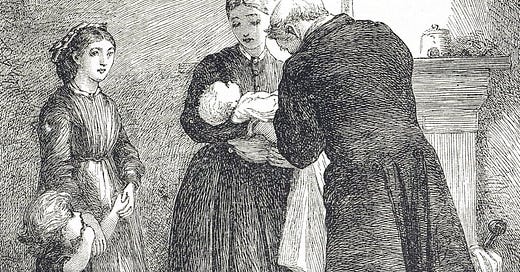076: We asked top docs about the measles outbreak—here's what they said
Exclusive: A pediatrician and OB/GYNs share guidance whether you’re pregnant, postpartum, or have kids of all ages
Welcome to Two Truths, a bestselling newsletter & media brand exploring the many truths of motherhood from journalists & maternal health advocates Cassie Shortsleeve of Dear Sunday Motherhood & Kelsey Haywood Lucas of Motherspeak. Two Truths is rooted in the healing & affirming principle that two (or more) things can be true. It’s a “best parenting Substack” per Motherly and The Skimm says you should subscribe; you’ll also find it in Vox, The Bump, Popsugar & more.
Twenty-five years ago, the Centers for Disease Control and Prevention (CDC) declared measles eliminated in the United States. Last month, amidst current measles outbreaks across the country, Texas reported the first measles-related death since 2015, bringing up concern around a once-eradicated disease.
Measles outbreaks happen; an outbreak simply means more disease occurs than expected. However, this current outbreak—at our time of publication, there have been 222 cases in 2025—marks a major scare for many in the medical community for a few big reasons:
Vaccination rates have dropped in recent years. Why that matters: When a significant portion of the population gets vaccinated, it creates something called “herd immunity”—protection from a particular infectious disease due to vaccination or previous infection.
For measles, a society generally needs a 95 percent vaccination rate to maintain herd immunity. Yet, in the 2023-24 school year, measles, mumps, and rubella (MMR) vaccine coverage among kindergarteners fell below that in more than 39 states. Nationwide, vaccination coverage among kindergarteners decreased to less than 93%, leaving communities vulnerable to outbreaks.
Vaccine hesitancy has increased in recent years for multiple reasons, including the COVID-19 pandemic. Newly appointed Health and Human Services Secretary Robert F. Kennedy Jr., a noted vaccine skeptic, has also contributed to the issue. He has been a vocal critic of the MMR vaccine, in particular, promoting widely debunked claims about its potential link to autism.
Numerous scientific studies have shown that the MMR vaccine is not linked to autism. The CDC, the World Health Organization (WHO), and other health authorities have repeatedly stated that vaccines, including the MMR vaccine, are safe and do not cause autism.1
The MMR vaccine, introduced in the 1960s and widely used in the 1970s, dramatically reduced the number of measles cases. It was a key factor in eliminating measles in many parts of the world, including the United States.
After being widely criticized for minimizing the current measles outbreak, Kennedy Jr. recently called the outbreak a “top priority.” Earlier this week, he wrote an opinion piece for Fox News in which he expressed support for the MMR vaccine while calling the decision to vaccinate “a personal one.”
He wrote: “Parents play a pivotal role in safeguarding their children’s health. All parents should consult with their healthcare providers to understand their options to get the MMR vaccine. The decision to vaccinate is a personal one. Vaccines not only protect individual children from measles, but also contribute to community immunity, protecting those who are unable to be vaccinated due to medical reasons.”
The CDC recommends that children receive two doses of the MMR vaccine:
One between 12 and 15 months of age
Another between 4 and 6 years
The group notes that teens and adults should also be up to date on their MMR vaccination.
(You can find out more details about vaccine recommendations here.)
Of course, there are always exceptions to these recommendations (for example, the CDC recommends infants traveling between 6 and 11 months receive an earlier dose of the MMR vaccine), and there are many questions right now.
What if you live in an outbreak area?
What if you’re pregnant?
What if you have a baby under one?
What if you’re just *worried*?
And so, this week’s issue of Two Truths is all about measles. It includes:
Conversations with a top pediatrician at a major children’s hospital and two OB-GYNs
What you need to know if you’re pregnant, postpartum, or a parent to older children
A key blood test you may want to consider
A poignant letter penned by a famous author in the 1980s about the measles vaccine
& more…
Our expert sources include…
Jessica Vernon, MD, PMH-C, a board-certified OB-GYN, associate medical director at Oula, and author of Then Comes Baby
Rachel Blake, MD, a board-certified OB-GYN in Boston
Sapna Singh, MD, chief medical officer at Texas Children’s Pediatrics
What to know about measles…
Keep reading with a 7-day free trial
Subscribe to TWO TRUTHS to keep reading this post and get 7 days of free access to the full post archives.







